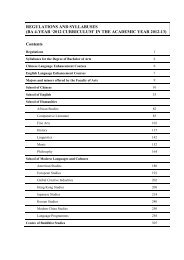Bachelor of Arts (BA) - The University of Hong Kong
Bachelor of Arts (BA) - The University of Hong Kong
Bachelor of Arts (BA) - The University of Hong Kong
Create successful ePaper yourself
Turn your PDF publications into a flip-book with our unique Google optimized e-Paper software.
188GEOG2062.China: the land and the people (6 credits)(This course is also <strong>of</strong>fered to second and third year non-<strong>BA</strong> students for inter-Faculty broadeningpurposes.)This is an introductory course about the evolving physical, cultural and political landscape <strong>of</strong> China.Emphasis is placed on (a) the natural environment and physical setting for development; (b) historicalgeography and evolution <strong>of</strong> the landscape; (c) the political system and post-1949 development; and (d)the growth and spatial distribution <strong>of</strong> population. <strong>The</strong> purpose is to assist students to better understandthe process <strong>of</strong> economic restructuring and spatial transformation in the context <strong>of</strong> a rapidly growingsocialist country. This course is the co-requisite/pre-requisite for GEOG2002. China developmentissues.Assessment: 40% coursework, 60% examination.This course will be <strong>of</strong>fered in the second semester.GEOG2063.Energy and environment # (6 credits)(This course is also <strong>of</strong>fered to second and third year non-<strong>BA</strong> students for inter-Faculty broadeningpurposes.)<strong>The</strong> course will provide a fundamental understanding <strong>of</strong> the relationships between energy and mineralresources exploitation and major environmental problems. It will involve studies <strong>of</strong> renewable andnon-renewable energy and mineral resources, their abundance and distribution, production andconsumption patterns, and factors that affecting the formulation <strong>of</strong> energy and mineral exploitationpolicies. Energy and mineral conversion technology will be briefly introduced, and followed bydiscussion on environmental impacts caused by large scale consumption <strong>of</strong> energy and mineralresources, in particular, fossil fuels. Special attention will be directed to major energy relatedenvironmental problems, such as, urban smog, acid rain and greenhouse effect.Assessment: 40% coursework, 60% examination.This course will be <strong>of</strong>fered in the first semester.GEOG2065.Urban planning: principles and practices (6 credits)(This course is also <strong>of</strong>fered to second and third year non-<strong>BA</strong> students for inter-Faculty broadeningpurposes.)This course introduces students to the subject <strong>of</strong> urban planning. It will first discuss the significance andobjectives <strong>of</strong> urban planning, relating the rise <strong>of</strong> this pr<strong>of</strong>ession to the changing configurations <strong>of</strong> ourincreasingly urbanizing world. <strong>The</strong>n, drawing upon primarily the experiences <strong>of</strong> the United States,some <strong>of</strong> the major concepts and issues relating to contemporary urban planning practice will bedeliberated. <strong>The</strong>se include competing planning theories on the planning process, the legal basis <strong>of</strong>planning as well as the interrelationships between planning, politics and social issues. <strong>The</strong> questions <strong>of</strong>land use planning, urban design, urban renewal, and environmental planning will be highlighted andexperiences from the United States and <strong>Hong</strong> <strong>Kong</strong> will be discussed and contrasted to illustrate thecomplexity <strong>of</strong> urban planning issues in different geographical, political and social settings. Students arestrongly encouraged to take one <strong>of</strong> the basic foundation courses on urban geography before enrolling inthis course.Assessment: 40% coursework, 60% examination.This course will be <strong>of</strong>fered in the first semester.# = Course to be <strong>of</strong>fered in biennial odd year, i.e. in 2003-04, 2005-06 and so on.
















